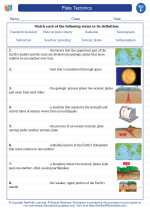Volcanism
Volcanism refers to the process of magma and volcanic gases rising through the Earth's crust and erupting onto the surface as lava, ash, and gases. It is a key geological process that shapes the Earth's surface and plays a significant role in the Earth's geologic and atmospheric processes.
Types of Volcanoes
- Shield Volcanoes: Broad, gently sloping volcanoes built by the eruption of low-viscosity basaltic lava.
- Stratovolcanoes: Tall, conical volcanoes composed of multiple layers of hardened lava, tephra, pumice, and volcanic ash.
- Cinder Cone Volcanoes: Small, steep-sided volcanoes created by the accumulation of tephra around the vent.
Volcanic Eruptions
Volcanic eruptions can be explosive or effusive, depending on the viscosity and gas content of the magma. Explosive eruptions, such as those seen at stratovolcanoes, involve highly viscous magma that traps gas, leading to powerful explosions. Effusive eruptions, commonly associated with shield volcanoes, involve low-viscosity magma that flows easily and produces relatively gentle eruptions.
Volcanic Hazards
Volcanic eruptions can pose various hazards to human life and the environment, including lava flows, pyroclastic flows, ashfall, volcanic gases, and lahars (mudflows). Understanding these hazards and implementing effective mitigation strategies is crucial for the safety of communities living near active volcanoes.
Study Guide
- Define volcanism and its significance in shaping the Earth's surface.
- Describe the three main types of volcanoes and their characteristics.
- Explain the differences between explosive and effusive volcanic eruptions.
- Identify and discuss the various hazards associated with volcanic eruptions.
- Research a famous volcanic eruption and its impact on the surrounding area.
Remember to study the geological processes, types of volcanoes, volcanic eruptions, and hazards associated with volcanism to gain a comprehensive understanding of this topic.
.◂Science Worksheets and Study Guides Sixth Grade. Plate Tectonics
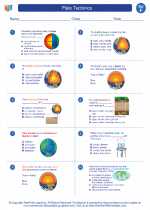
 Worksheet/Answer key
Worksheet/Answer key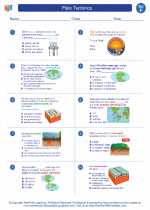
 Worksheet/Answer key
Worksheet/Answer key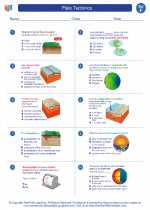
 Vocabulary/Answer key
Vocabulary/Answer key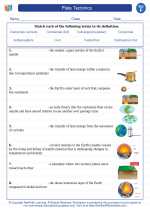
 Vocabulary/Answer key
Vocabulary/Answer key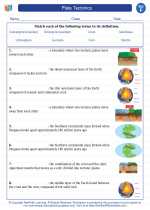
 Vocabulary/Answer key
Vocabulary/Answer key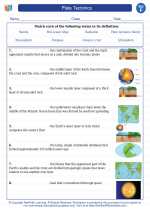
 Vocabulary/Answer key
Vocabulary/Answer key